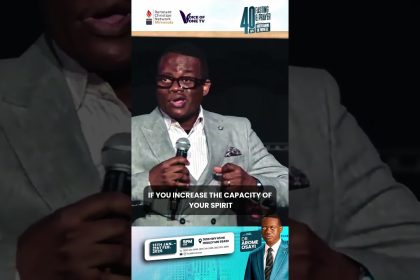By Stellamaris Ashinze
Major stakeholders in Nigeria’s Fintech subsector on Tuesday collectively underscored customer trust as the critical currency driving the nation’s digital financial future.
The stakeholders made this assertion at the 8th Edition of the Nigeria Fintech Week (NFW) 2025 in Lagos.
The News Agency of Nigeria (NAN) reports that the 2025 NFW had the theme: “The Fintech Ecosystem Symphony: Orchestrating Nigeria’s Digital Future”.
The stakeholders stressed that for customer trust to drive the nation’s digital financial future, it must be underpinned by advanced security, Artificial Intelligence (AI), strict compliance and collaboration.
The Governor, Central Bank of Nigeria (CBN), Mr Olayemi Cardoso, in his keynote address, reiterated the importance of customer trust as the bedrock of digital banking.
The CBN governor said that a sustained growth in digital transactions with total electronic payments reaching 4.12 billion transactions valued at N384 trillion, as of July 2020, reflected public confidence in digital platforms.
Cardoso, who was represented by the Director, Payment System Supervision, Dr Rakiya Yusuf, likened the Fintech ecosystem to a symphony that required collaboration and a balance between inclusion and security.
“The Apex Bank introduced the principle of “Compliance by Design”, which requires innovators to embed standards, consumer protection and security considerations including KYC processes, data protection and risk controls into product development from the very beginning.
“This approach is fully enforced by the CBN research directive on ISO 20022 compliance and the mandate for geofencing and geotagging of terminals.
“These are measures designed to enhance data quality, curb fraud and improve the traceability of payment activities nationwide.
“Embedding compliance within system design not only mitigates risk but also creates a more resilient and trusted payment ecosystem,” Cardoso said.
He urged entrepreneurs to see regulators as partners in building a responsible ecosystem with inclusion and growth as national imperatives.
Cardoso also lauded the decentralised format of the Fintech Movement 2025, saying that it reinforced the principle that Fintech innovation was a “national imperative, and not a regional privilege”.
The Group Executive, Technology and Services, First Bank of Nigeria (FBN), Callistus Obetta, said that the bank’s 131-year legacy was a measure of the enduring trust of its customers.
Obetta spoke on the theme, “Transforming Trust through AI, Security and Customer-First Digital Finance”.
He said that while the Fintech subsector was experiencing exponential growth driven by accelerating financial inclusion, new challenges like cyber threats and sophisticated fraud schemes threaten to erode public trust.
“The truth is, in a new world of banking, trust is the currency that underpins everything else.
“Also, the biggest tools to build that trust, AI, security, and customer-first digital infrastructure are at the heart of my message today,” he said.
Obetta said that the bank was actively leveraging AI across its operations; its flagship mobile apps, FirstMobile and Meetup, use data-driven insights to customise recommendations and enhance the customer journey.
He said that AI-powered analytics are used in frontend management to detect suspicious activities and stop threats in real-time.
The executive, however, cautioned that the true power of AI lay in its responsible application, demanding that transparency, the avoidance of bias, and ethics be placed at the centre of every decision.
“Security remains the principal goal as without security, trust collapses,” he said.
He highlighted the bank’s security measures, including the ability of its First Mobile Analytics App to detect diametric potentiation and the protection of USSD banking by multiple layers of authentication.
Obetta noted the bank’s commitment to placing its customer first through initiatives like First Money Wallet and HNBeto.
He explained that these initiatives provided access to formal financial services for millions in rural and under-served areas.
Obetta also announced N1 trillion in digitally disbursed loans.
Sen. Adetokunbo Abiru, Chairman, Senate Committee on Banking, Insurance and other Financial Institutions, in his goodwill message, said that Nigeria’s economic future was critically linked to digital innovation and collective action.
Abiru said that there was the need for industry leaders to act as key changemakers in shaping the nation’s digital trajectory.
He said that the call to action served as a poignant reminder that the future was a direct result of the collective actions or inactions of stakeholders across the public and private sectors.
The lawmaker likened the effort to a symphony orchestra, stating that the digital economy was never ever a one-man show, but rather the collective and collaborative efforts of all key players.
He urged all stakeholders to contribute their quota across their respective spheres of influence.
Abiru recognised the vital role digital innovation played in driving economic growth, improving governance and enhancing the quality of life for all Nigerians.
He underscored the impact of collaborative partnerships by highlighting the establishment of the SAIL Innovation Lab, an initiative he co-founded.
According to the lawmaker, the Lab is created to provide young people with free access to upskilling in high-demand technology skills and positioning them to compete favourably in the global market.
He called on all stakeholders to continually support and nurture the innovation ecosystem by providing the necessary resources, mentorship and platforms for technology and collaboration to thrive.
Abiru expressed appreciation to the Fintech Society of Nigeria for its work, and urged attendees to ensure the conference sparked an “explosion of collaborations and strong partnerships.”
He expressed hope that these collaborations and partnerships would help build a Nigeria that was digitally empowered and a leader in the global innovation sphere.
In his welcome address, the President, FintechNGR, Dr Stanley Jacob, said that the gathering represented more than a conference, noting that it was more of a convergence of ideas, innovation and partnerships.
Jacob said that the convergence of ideas would shape the trajectory of Nigeria’s digital economy.
He said that this progress reflected the collective resolve to deepen financial inclusion, strengthen trust and unlock new opportunities for sustainable growth.
Also, Dr Jameelah Ayedun, Chairman, NFW 2025 Organising Committee, said that this edition was designed not only to inspire bold conversation but also to catalyse actionable outcomes.
Ayedun expressed hope that the outcomes would strengthen trust, advance inclusion and accelerate the nation’s journey towards building a resilient digital economy. (NAN)(www.nannews.ng)
Edited by Christiana Fadare







